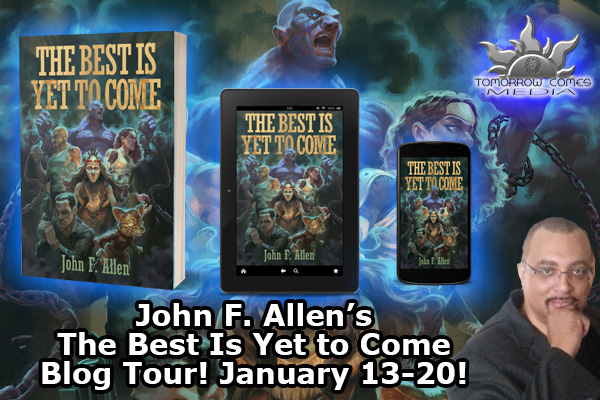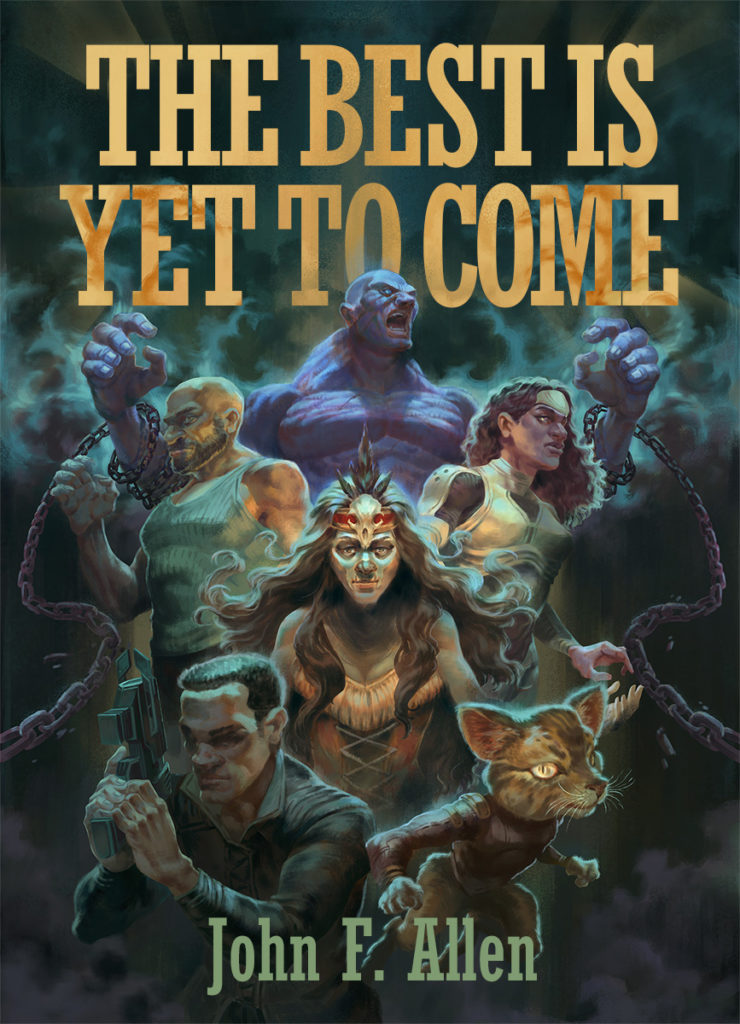John F. Allen is an American writer born in Indianapolis. He is a founding member of the Speculative Fiction Guild and a member of the Indiana Writers Center. He began writing stories as early as the second grade and has pursued various forms of writing throughout his career. John studied liberal arts at Indiana University – Purdue University Indianapolis with a focus in creative writing and literature, received an honorable discharge from the U.S. Air Force and is a current member of the American Legion. John’s debut novel The God Killers was published in 2013 by Seventh Star Press, and he has had several novellas, short stories and articles published since. He is also an avid reader, accomplished visual artist and jazz music aficionado.

I knew early on in my writing career that I wanted to explore stories written in a wide range of genres. This also reflects my diverse reading tastes. I didn’t want to be pigeonholed into writing the same type of stories, because my readers only expected them. I’ve seen other writers who are known for one particular genre for years, who later write in another and aren’t as well received, mostly because they aren’t known for those genres. I’m not saying that is the case for all authors who cross genres later in their careers, but it happens and when it does it’s very unfortunate.
It has been my philosophy that I’d write stories and novels in various genres from the beginning of my career and publish a short story collection which contained multi-genre stories, so that my readers can get a sampling of my versatility as a writer. This is why my first short story collection, The Best is Yet to Come, contains ten multi-genre stories which range from literary fiction, science fiction, fantasy, horror and beyond.
During my time as a writing student, my assignments were largely literary fiction stories and the mechanics of story-writing in general. This was actually of significant importance to my genre fiction writing, as it helped me to ground my writing in the commonality of the human condition, which is the most important through line for all fiction writing, in my opinion.
However, there are many specific and unique elements which each individual genre offers for both the reader and the storyteller.
For example, science fiction offers the writer and their readers to explore the scientific and technological marvels of our world, as well as those expanded possibilities from the storyteller’s imagination. As a writer, I personally find science and technology to be fascinating subjects and often read news articles, magazines and academic journals for my own interest.
So when an idea for a science fiction story presents itself, I’m able to utilize the knowledge from my reading to add validity to the fiction and ground it in our reality. This accomplishes two things. Firstly, it acknowledges the scientific and technological progress mankind has made and is continuing to make. Secondly, it offers hope that the progress made will create a brighter future for generations to come or serves as a warning for the consequences of misusing that progress and potentially darker times ahead.
Another example is the fantasy genre. This particular genre allows the reader to experience things from the perspective of a foreign world, usually steeped in magic and mysticism, with an ancient-like setting that is devoid of scientific and technological progress. This genre challenges the storyteller to utilize human history and folklore as elements in their tales, while maintaining the human condition through line. As an armchair historian, this fascinates me in that it allows me to reach into the rich tapestry of human history and pull from the real-life stories, people and settings to create.
When the idea for a fantasy story begins to percolate in my mind, I draw upon ancient histories, people and their cultures as the base for my world building. This serves as the bridge and connective tissue with which the reader can relate and accomplishes similar objectives to science fiction. Firstly, it acknowledges the historical and cultural progress mankind has made and is continuing to make. Secondly, it offers hope that the progress made will continue to move forward in positive and progressive ways, while we learn from the mistakes of the past and avoid repeating them.
Genre writing also gives the storyteller and the reader, the opportunity to explore cultural and racial diversity from the human vantage point. This is particularly important in opening new and exciting settings to the reader, as most genre fiction is it often told from a Eurocentric perspective lens.
Human diversity in genre fiction opens up new settings and points of view to the reader and allows the storyteller to express themselves in a much more personal and passionate manner. With any luck, this very same passion from the writer is translated in their work, the benefit of the reader, which affords them a new and exciting experience.

Featuring ten stories collected for the first time, The Best Is Yet to Come presents nine years of creativity spun from the mind of John F. Allen. Action and adventure are ever-present in these stories, but be prepared for some drama, horror, fantasy and science fiction as well.
This volume includes a holiday story, “An Ivory Christmas,” featuring Ivory Blaque, Allen’s bold heroine from his acclaimed urban fantasy series The God Killers.
Also included are:
“Forest of Shadows” is the debut of a fabled, ancient warrior named, Jaziri, Prince of Kimbogo Province.
You may want to think twice before venturing out into the dark woods of rural Indiana in “The Legend of Matchemonedo.”
A young set assistant of a 1950s science fiction serial gets to embark on the journey of a lifetime in “The Adventures of Star Blazer.”
A young woman in late 1970s Indianapolis learns to be careful what you wish for in “HoodRatz.”
When a woman struggles to care for her ailing father, she discovers the truth behind her troubled past in “The Sweetest Autumn.”
Long ago, a noble samurai finds forbidden love with a beautiful, ebony-skinned princess in “The African Princess.”
A mysterious, military operative is sent on a covert mission in Egypt, when he encounters an alien monster bent on revenge in “Lazarus.”
Forty years ago, a young boy discovers that family means everything in “The Chocolate Malt.”
The Best is Yet to Come also features the special bonus short story, “Witch Way is Up.”
Explore the words of John F. Allen today!

- Website: https://johnfallenauthor.com/
- Twitter: https://twitter.com/jfa_author
